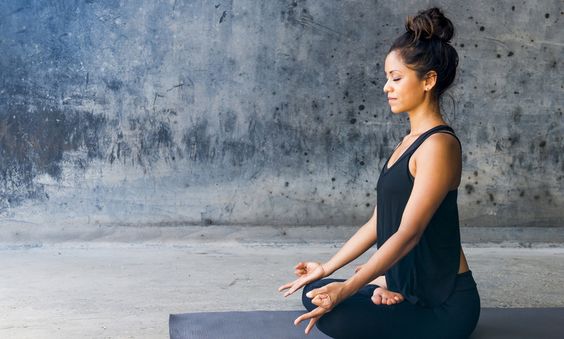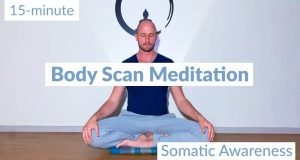
Stress is nothing new in today’s competitive environment. Who is not vulnerable to stress, pressure, and depression. But Ignoring it is not right for health. This can be overcome. Meditation means meditation.
Everyday 5 minutes of meditation before going to work, school, or anywhere in the morning keeps you free from stress throughout the day. This makes you remain energetic as well.
There are many ways of meditation. So, see below some ways that are the best meditation for stress relief.
Contents
Why Is Meditation Important In Our Lives?

There are still some folks out there who think meditation is the province of free spirits who like dozing off on a braided grass mat somewhere when the subject of mindfulness is brought up. But the truth is that mindfulness and awareness meditation is not woo-woo.
These profoundly transformative techniques have been known for ages, and almost all spiritual paths incorporate some variation of them.
Despite having Buddhist origins, non-secular mindfulness meditation is now practiced by individuals of various ages and religions. You might be wondering, “But why should I meditate?” despite meditation’s astounding popularity.
When explaining the benefits of meditation, people often ask why meditation is important. Many people ask about the benefits of meditation and its imperative. At present, meditation has become very important.
There are two reasons for this. The first reason is that in the present time man is heavily surrounded by work. Being stressed due to being surrounded by work is natural. Therefore, to reduce stress, there is nothing better than meditating in today’s time.
The second biggest reason for meditating is that by meditating regularly, a person stays away from hundreds of types of unhealthy diseases. These are the diseases that surround the human body due to inadequate circulation of blood and stress.
When the blood circulation of the human body is correct due to meditation, then it starts getting away from these diseases. It is believed that people who meditate regularly are much healthier than others.
Many diseases surround human beings due to stress, which includes premature aging, hair loss, and reduced eyesight. At the same time, when a person meditates, then he can keep himself away from these very serious diseases.
Meditation has many advantages. The tradition of meditating is now developing in every country. People in many countries are keeping themselves healthy through this art.
Improves Our Mood
In general, persons who meditate live better lives than those who don’t. It is well known that meditation improves the flow of happy emotions and helpful thoughts. Regularly meditating for even a few minutes can have a significant impact.
Scientific research was done on a group of Buddhist monks while they were meditating, which provides support for this assertion. The brain region associated with happiness, the pre-frontal cortex, was shown to be particularly active in monks.
Aids In Falling Asleep
Everyone fears a night without sleep, making insomnia a troubling condition. Unfortunately, a third of Americans experience occasional or chronic sleep deprivation in some way. Meditation may be the answer if you’re one of those unfortunate people who spend the entire night counting sheep while staring up at the ceiling.
According to a post on the Harvard Health Blog, meditating causes a relaxation response, which is why other people experience the opposite issue and fall asleep as soon as they start!
Aids In The Management Of Stress, Anxiety, And Sadness
It’s important to recognize meditation’s power to transform. The University of Wisconsin conducted studies that demonstrated the physiological benefits of meditation on the brain.
For instance, studies have shown that regular meditation practice causes the area of the brain that controls stress and anxiety to shrink.
Meditation practitioners are teaching the mind to remain calm even in difficult conditions by concentrating on moment-by-moment experiences. They also feel substantially less anxious about the future, which is related to the previous point.
Helps To Improve Memory
Meditation not only makes you happier and makes you feel better overall, but it also keeps your memory clear and your focus firm. You practice remaining non-judgmental in the present moment by practicing mindfulness meditation.
As a result, you are less and less prone to be carried away by distractions. One additional argument in favor of meditation.
We doubt you still require persuasion after reading the six facts and examples about meditation we’ve provided above. Our Mindworks free online meditation course offers coaching, guided meditations, tips, and inspiration to help you get started and continue on your mindful path. Happy travels!
What Is Meditation For Stress?

The practice of meditation dates back thousands of years. The initial purpose of meditation was to aid in a deeper comprehension of life’s mystical and sacred elements. Nowadays, meditation is frequently used to unwind and reduce tension.
Considered a form of supplementary medicine for the mind and body, meditation. Deep relaxation and mental calmness are two effects of meditation.
You concentrate during meditation and get rid of the constant stream of disorganized ideas that could be stressing you out. The approach may lead to improved mental and emotional health.
Currently, there are many reasons for stress. At the same time, a person of every age struggles with this problem. Television advertisements attract people to reduce daily stress.
In big metros, people struggle with the problem of stress a lot, but it is a very effective weapon to eliminate stress. That weapon is ‘meditation’.
Meditating for a few minutes every day brings peace to the mind. This will provide mental, emotional, and physical relief. By meditating, a person reaches a different world, and when he returns, he finds it very beautiful in his world.
Yes, when we are in meditation, then we see our weaknesses and our strengths, which helps us to improve ourselves. By meditating, we get relaxed and the mind becomes happy.
Your sensation of quiet, peace, and balance that meditation can bring you can help your physical and emotional health. By concentrating your focus on something peaceful, you can also utilize it to unwind and manage stress. You can learn to keep your focus and maintain inner serenity by practicing meditation.
And once your meditation session is over, these advantages continue to exist. You can go about your day in more tranquility if you practice meditation. Additionally, meditation may aid in the management of certain medical disorders’ symptoms.
Meditational Elements
To aid with meditation, many techniques may have a variety of aspects. These may change based on whose advice you heed or who is instructing a class. The following are some of the most typical aspects of meditation:
- Relaxed breathing: Using the diaphragm muscle to expand your lungs, this technique entails deep, even breathing. The idea is to breathe more slowly, inhale more oxygen, and breathe more efficiently by using fewer shoulder, neck, and upper chest muscles.
- A concentrated effort: One of the most crucial aspects of meditation is generally being able to focus your mind. You may relax your mind from the numerous distractions that lead to stress and worry by focusing your attention. A particular object, a mantra, an image, or even your breathing can be used to direct your attention.
- A calm environment: If you’re a beginner, it could be simpler to meditate if you’re in a place with few distractions, such as one without television, radio, or telephones. As you develop your meditation skills, you could be able to meditate anywhere, particularly in stressful situations when it will be most beneficial for you, like a traffic jam, a difficult work meeting, or a long grocery line.
- Open Mindset: Allow yourself to think without filtering them.
- A Relaxed Position: Whether you’re seated, lying down, walking, or engaged in another activity, you can meditate. Just make an effort to be at ease so that you can benefit the most from your meditation. Maintain a straight spine while you are meditating.
What Are The Best Meditations For Stress?

The benefits of meditation for managing stress and maintaining good health are enormous. Even if there are numerous excellent meditation techniques, each one offers something special, and you can find that some meditations are more pleasant for you than others.
You should only attempt meditations that feel right to you since those are the ones you will stick with.
The following are some of the most well-liked, satisfying, and stress-relieving meditation techniques; experiment with a few and find which one suits you best. After that, commit to regular practice and allow your chosen meditations to change your life.
In a run-of-the-mill life, you inadvertently become a victim of stress. We are constantly moving towards depression with the routine of getting up early in the morning and getting ready for the office early. What to do in such a way that we can get rid of this uninvited guest?
How to remove stress, increase energy, activity, ability to work, and creativity. Today we will try to answer your questions. With their help, you can get a relaxed mind in your runaway life. So, let’s know about some best meditations for stress.
1. Calming Meditation:
Calming meditation is the best meditation for stress. This meditation leaves you calm and happy. This meditation will make you forget all your tension and stress.
Meditation sessions with mindful breathing not only help in reducing stress but also reduce blood pressure. So, see below how to do overwhelmed meditation.
How To Do:
- Sit on the ground or your bed in Padmasana.
- Place your palms on your thighs.
- Close your eyes and stop thinking.
- Initially, you can start it with 5 minutes.
2. Deep Breath Meditation:
In another method of meditation, you have to focus on your breath. It also helps you get rid of stress. This meditation is one of the best meditations for stress. Doing this is also very much easy. So, see below how to do this.
How To Do:
- For this, you close your eyes.
- Meditate on your every breath.
- Focus on exhaling 5 times and focus on exhaling 10 times.
- In the ratio of 1: 2 you can increase this number by subtracting.
- For better results, you should repeat this process every day for about 10 minutes.
3. Imaginative Meditation:
The third method is a test of your imaginative power. This meditation helps you to forget all your tension and focuses you to calm down. The strength of our imaginative creativity demonstrates a number of advantages of our meditation.
For instance, using your imagination creatively while meditating creates happiness and inner calm. Creative imagination consequently revitalizes our body and spirit. Creative imagination and benefits go hand in hand; the better the imagination, the greater the advantages.
Even professional athletes utilize their imaginations to create scenarios before playing a real game because it helps them concentrate. And if I include my own experiences, having a creative imagination also boosts confidence and gives one the drive to succeed and never give up. See below the methods to do this meditation.
How To Do:
- For this, you lie on your back.
- Keep your hands and feet spread.
- Now imagine a burning candle.
- Feel the heat of this candle in your left leg and bring it to the abdomen, chest, shoulders, and neck, passing through the ankle, heel, knee, and thighs.
- Then take the imaginary experience of this summer on your left-hand side. Repeat the same process from the right side.
4. Shaking Meditation:
Have you ever noticed that all animals shake? You must have noticed that when a dog wakes up sleeping or encounters a new situation, he moves. Shaking removes old energy and tension. We, humans, shake when we are fighting or our heartbeat becomes very fast.
This means that when we are under some mental trauma or danger, we start moving. Shaking is an easy way to get rid of it.
By shaking your body for 15 minutes, you can relieve fatigue throughout the day and calm your mind. By shaking, our nervous system becomes active and sends a signal to our brain to relax, relax. Shake also activates our lymph system, which helps us get rid of toxins.
How To Do Shaking Meditation:
- To do the shaking meditation, stand upright and open your legs.
- After this, leave your knees loose and your shoulders loose.
- Start moving and jump slowly.
- With this, there will be tingling in your hands and shoulders.
- Shake the whole body slowly and allow the whole body to move.
- You can also do this by applying music if you want.
Best Time To Practice Meditation To Get Rid Of Stress:
In the present age, special classes are conducted to meditate. In this, a large number of people reach and meditate by sitting in a secluded place. People go to these classes in the morning and evening according to their convenience. If you look at the old books, then it is known that the best time to meditate is in the morning.
It is believed that when a person wakes up in the morning, his entire body is refreshed and there is no work pressure on the brain. In such a situation, a person can wake up in the morning and meditate in a secluded place in the open air for at least half an hour.
This fills his entire body with new energy, which makes him feel fresh in his body throughout the day.
It is also a condition of meditating in the morning that a person sleeps early the night. If an angry person sleeps after going to bed at night, then his entire body gets enough rest. This allows him to function better the next day.
Meditation done before sunrise is very beneficial for the human body. The atmosphere is quite cold before sunrise, which gives a lot of peace to the mind while meditating.
SUMMARY:
Removing stress is not the goal of meditation; instead, managing stress levels is the goal of meditation. That largely comes down to how we view stress. We can decrease the effects on our mental and physical health by changing our perspective.
Stress frequently gets a bad rap, which may not be entirely fair. Consider where we could be if we didn’t have the distress signal that prompts us to run away from danger. Or if we weren’t under any time constraints to complete a project or our assignments.
Some people excel in high-stress occupations, feeling in great control in the fast lane and thoroughly stressed out in the slow lane.
Thus, the levels of stress might differ greatly from person to person. Even positive experiences that are for the best will cause tension. It cannot be avoided.
The degree of distress we identify with a particular occurrence depends on how we evaluate stressful circumstances. But by viewing this through the prism of mindfulness, we can soften our perception of stress and adopt a more welcoming attitude toward it.
Try to refrain from assigning negative labels the next time we encounter a stress response in a “positive” scenario. Consider it as something strong and invigorating that will better equip us to handle life’s obstacles.
Now, when we are under pressure, it may seem counterproductive to just sit quietly and do nothing; practicing meditation may seem like the last thing we need to do.
But pushing pause is the best approach to clear the mind when we feel under pressure, are unable to think clearly, or have too much going on.
In these conditions, the goal of meditation is to increase mental space. And it’s there that we become conscious of our tension. We don’t push it away or try to thwart it.
Simply by sitting and allowing all thoughts and emotions to surface, we may then let them go by directing our focus back to the breath. This gets simpler with repetition, and we eventually begin to rely on the breath as a stress release mechanism.
FAQ:

Q. What type of meditation reduces stress?
A. Transcendental meditation and Mindfulness meditation practices are the best types of meditation that help reduce stress. Here is how
Mindfulness meditation: During mindfulness meditation, your conscious awareness is widened. During meditation, you pay attention to the sensations you are having, including how your breath is moving. Your ideas and feelings are visible.
Transcendental meditation: Without requiring focus or effort, this type of meditation may enable your body to enter a deep state of rest and your mind to experience a feeling of inner peace.
Q. What is the most effective meditation for anxiety?
A. To manage stress and anxiety, mindfulness is a practice that can assist the body and mind unwind. The goal of mindfulness meditation practice is to bring the mind into the present moment, enabling it to be aware of feelings, and helping relieve stress and sensations without judging them.
Mindfulness is great for stress management, stress response, and curing mental health conditions. Research suggests that body scan meditation and other guided meditations help in mindfulness-based stress reduction.
Q. What is the most powerful type of meditation?
A. The most well-known and extensively studied type of meditation practiced in the West is mindfulness meditation, which has its roots in Buddhist teachings.
During a mindfulness meditation session, you focus on your thoughts as they come and go. You don’t condemn or identify with the thoughts. You simply keep an eye out and note any patterns.
This exercise combines awareness and concentration. While observing any physiological sensations, thoughts, or feelings, you might find it useful to concentrate on anything or your breathing.
Due to its simplicity, this style of meditation is suitable for those without an instructor to act as their guide.
Q. How effective is meditation for anxiety?
A. Deep relaxation and mental calmness are two effects of meditation. You concentrate during meditation and get rid of the constant stream of disorganized ideas that could be stressing you out. The approach may lead to improved mental and emotional health.
Guided meditation offers progressive muscle relaxation and removes negative emotions. Thus, to get rid of chronic stress, you need to do regular meditation practice, for example, mantra meditation.
More Recommended Articles:-




